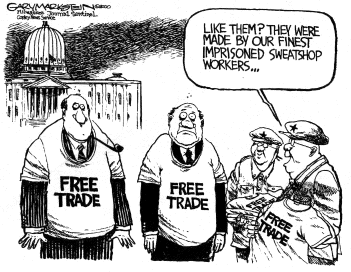
By Arthur Macewan
From the North American Free Trade Agreement (NAFTA), adopted in the early 1990s, to the Trans-Pacific Partnership (TPP) and the Transatlantic Trade and Investment Partnership (TTIP) being advanced today, criticism has focused on the negative impacts of these agreements on employment in many U.S. industries. These negative impacts are real and are one factor contributing to the decline of manufacturing in the United States, to the stagnation of wages, and to the hollowing out of the “middle class.” Yet, another impact of these agreements generally gets ignored—namely their negative impacts on progressive economic and social policies. Here too the impacts are real, but they are not absolute. Take the issue of fiscal stimulus—that is, when the government runs a budget deficit, spending more to increase output and create jobs than it is taking in as taxes. In 1970, imports of goods and services were only 6.3% as large as GDP, but in 2014, imports were equal to 18.2% of GDP. This implies that in the earlier era, of a dollar spent on goods and services in general, only 6.3% would go towards imports. Today, as liberalization of trade has brought about the larger role for imports in GDP, a much larger share would go for the stimulation of jobs and output abroad. That is, the impact would in part “leak” out of the U.S. economy.
Read rest here
